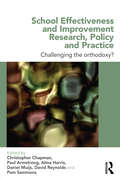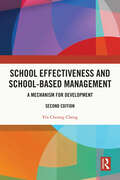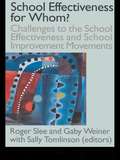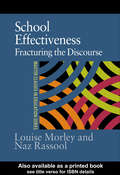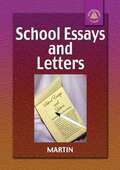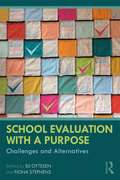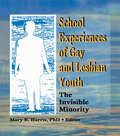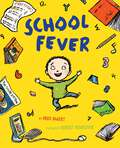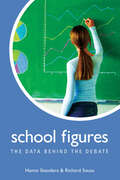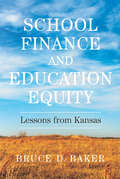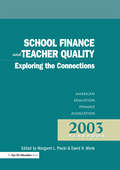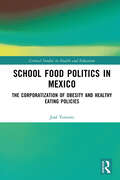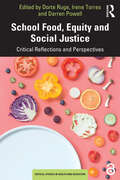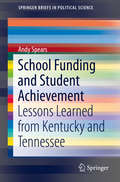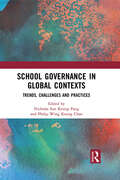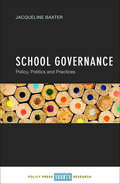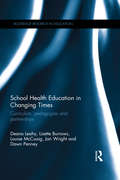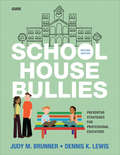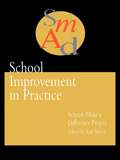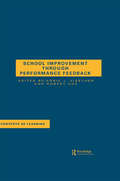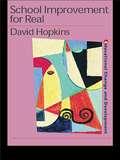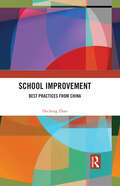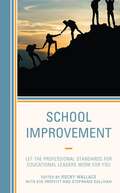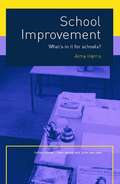- Table View
- List View
School Effectiveness and Improvement Research, Policy and Practice: Challenging the Orthodoxy?
by David Reynolds Daniel Muijs Alma Harris Paul Armstrong Christopher Chapman Pam SammonsThis book provides a contemporary overview of school effectiveness and improvement. It charts the development theory and research in this area and looks at the contribution made to policy and practice. It also challenges some assumptions that have become ingrained into the theoretical and methodological traditions of the field. By challenging these orthodoxies, it provides a framework that sets a new agenda and repositions the field to meet the emerging challenges of the twenty-first century. It argues that traditional measures of school effectiveness are challenged as systems have attempted to adapt to a complex range of emerging agendas. New theoretical perspectives are required which consider 'education' and a 'broader set of outcomes'. This shift requires a rethink of how effectiveness and improvement have been understood by the field, and a reconstruction by policy makers and practitioners. Attention must be given to promoting equity as well as effectiveness so that one school or student's gain no longer means another's loss. The field must develop new methodologies if inequities are to be challenged and a broader set of outcome measures are to be developed. The two questions guiding this book are: How can educational effectiveness and improvement research and practice support the development of a more equitable education service? What are the key indicators of educational effectiveness and improvement and what are the new methodologies required to facilitate a shift from 'school' effectiveness and improvement to 'educational' effectiveness and improvement? This book uses lenses of research, policy and practice to explore these key questions and articulate what such a repositioning may look like and how it may be achieved. It will prove invaluable for teachers, school leaders and anyone involved in policy and educational research.
School Effectiveness and School-Based Management: A Mechanism for Development
by Yin Cheong ChengThis new edition of an internationally renowned classic book provides a new comprehensive framework of latest perspectives and findings, fills gaps in the ongoing research, policy and practice, and re-engineers a school-based mechanism for understanding and managing school-based development initiatives. The book addresses the burning issues about how school-based management (SBM) and school effectiveness should be related to the new paradigm in education and the third wave of education reforms worldwide. The book includes four parts and 12 chapters covering (1) School Effectiveness (i.e., multiple school functions, models of effectiveness and pursuit of dynamic effectiveness); (2) SBM (i.e., theories of SBM, multi-level self-management (SM), and its implementation); (3) Leadership for Change (i.e., leadership for SBM, staff development, school-based change, and curriculum change); and (4) Future Developments (i.e., an SBM mechanism for effectiveness and paradigm shift towards the third wave). The framework and related analysis will benefit the understanding, policy formulation, school practice and research of the key stakeholders including policy makers, educators, change agents, researchers and those concerned in facing the challenges from the ongoing education reforms in different parts of the world.
School Effectiveness for Whom?: Challenges To The School Effectiveness And School Improvement Movements
by Roger Slee Sally Tomlinson Gaby WeinerSchool effectiveness research together with what is now described as the 'school improvement movement' (Barber, 1996) has captured both the Conservative and New Labour imaginations as a basis for educational planning and policy making in the UK. Internationally school effectiveness enjoys and expanding and enthusiastic audience.This book provides a critique of this research genre, particularly in the light of the recent calls for teaching to go 'back to the basics'. The editors argue that this school effectiveness research is simplistic in its analysis of educational problems. Far from getting to the bottom of the problem of failing students and schools, they argue, these 'movements' are merely scratching at the surface of the problems and coming up with notions for superficial improvements.
School Effectiveness: Fracturing the Discourse (Master Classes In Education Ser.)
by Louise Morley Naz RassoolHow have the school effectiveness and school improvement movements arrived where they are today? Over the past three decades there has been a great deal of development, from the 1960s when debates arose regarding equality of opportunity, to the 1980s when market concepts came into play. This book contrasts current thinking on educational standards with prevailing thought from prior decades, and tackles difficult questions of quality and educational outcomes. Anyone wishing to improve their understanding of school effectiveness will find this book interesting and highly informative.
School Evaluation with a Purpose: Challenges and Alternatives
by Eli Ottesen Fiona StephensSchool evaluation is often linked to issues of accountability, performance assessment, regulation and inspection, where the work of teachers and/or the functioning of the school becomes the subject of critique. School Evaluation with a Purpose explores the latest thinking surrounding external and self-evaluation in schools. Examining teacher professionalism, reflective practice and what really matters in education, it considers the key challenges around current evaluative practice and puts forward alternative methods of evaluation, placing reflective practice and teacher professionalism at its heart. Exploring the stories of evaluation and the practice of resilient schools and school leaders in five European contexts, the book aims to support and promote the agency of teachers, school leaders and students. This book will be of particular interest to school leaders internationally, researchers, master's students of Education and Education Leadership, and policymakers responsible for law enforcement in the field of school inspection.
School Experience: Explorations in the Sociology of Education (Routledge Library Editions: Sociology of Education #60)
by Martyn Hammersley Peter WoodsFirst published in 1977, this volume brings together a range of viewpoints, informed by reports of empirical research, which bear on the experience of school. Each chapter demonstrates the application of the ‘new sociology of education’ in its various guises to the world of teachers and pupils. In doing so, they exemplify the fields of investigation opened up by these theoretical developments, and also suggest directions ahead. The tensions in the articles reflect the tensions that existed in the sociology of education. By bringing them together, the aim of this volume is to contribute to a more soundly based sociology of education.
School Experiences of Gay and Lesbian Youth: The Invisible Minority
by Mary B HarrisSchool Experiences of Gay and Lesbian Youth: The Invisible Minority shows teachers, youth advocates, administrators, and academic researchers how to embrace the needs of sexual minority students. Through research and case studies, this book explains the ways in which schools are failing the vulnerable population of gay, lesbian, and bisexual youths. This text shows you how to take responsibility for recognizing and protecting the rights and needs of gays and lesbians and ridding schools of discrimination, harassment, and violence.As School Experiences of Gay and Lesbian Youth illustrates, the consequences of the cognitive, social, and emotional isolation that sexual minority youths experience as a result of homophobia and heterosexism can be devastating. With this book’s helpful suggestions, provocative insight, and open challenges, you can help gay and lesbian youths develop feelings of self-worth as well as positive aspirations for their futures. Experiences of Gay and Lesbian Youth will help social workers, psychologists, academics, counselors, and other professionals understand: the dearth of role models in the career development of lesbian and gay youths how to integrate sexual orientation into career counseling how to incorporate the topic of homosexuality into educational curricula forms of homophobia (from the victim’s and the agressor’s points of view) and heterosexism in the high school environment how to open discussions about gay and lesbian issues at school the importance of having visible lesbian, gay, and bisexual staff who can provide support for sexual minority youthSchool Experiences of Gay and Lesbian Youth also informs you on the experiences gay and lesbian adults who attended high school five to fifty years ago, as well as college students who have reported incidents of homophobic behavior in high school. In addition, this text discusses teachers’fears of being fired as a result of talking about sexual minority issues and how school environments can lead students to become drop outs. Experiences of Gay and Lesbian Youth will inform you on the issues facing gay and lesbian youth and provide you with suggestions on how to make the classroom a welcoming environment, regardless of sexual orientation.
School Fever
by Brod BagertA kid's-eye view of school, crammed with enough funny to fill a big yellow bus!Snappy and hilarious in true Brod Bagert style, these goofy poems are united by their kid authenticity and quirky school themes. From a computer virus that one kid claims is sure to keep him homesick until summer vacation, to the librarian who tames "the savage beast" (a mouse run amok in the library), to a superhero recruited to scare off the school bully, this is most definitely not your typical poetry collection. Robert Neubecker's bright, dynamic artwork propels each poem into another stratosphere of funny. By the end, kids will have contracted a different strain of school fever altogether."Kids will appreciate the humor and will see themselves in the high-energy narrator"—Booklist
School Figures: The Data behind the Debate
by Hanna Skandera Richard SousaSchool Figures presents statistics, along with historical trends and cross-sectional comparisons, to provide a clear, factual picture of today's K–12 education landscape, including information on school demographics, cost and finance, testing and achievement, public school reform, and other key areas.
School Finance and Education Equity: Lessons from Kansas
by Bruce D. BakerThis inspiring account of bipartisan political success delivers an expert breakdown of how and why Kansas—a politically conservative state—was able to craft a stable, balanced, and equitable system of funding for its public schools. Beyond a chronicle of one state&’s achievements, School Finance and Education Equity provides invaluable policy guidance and lays out a blueprint that other states can use to strengthen their own public education systems.Readers are given an insider&’s tour of the Kansas story by Bruce D. Baker, an academic researcher and expert witness in school finance litigation. With more than two decades of involvement with the state, Baker combines historical background, legal analysis, and political and economic contextual data—along with a gleaming wit—to present a thorough, enlightening narrative of Kansas&’s K–12 funding journey.As Baker points out, other states can find much to learn here. He shows that, when it comes to school finance, Kansas serves as an exemplar in aligning resources to meet the promises of its constitution. State leaders rejected the pervasive notion that money doesn&’t matter in education, and they gathered the data to prove that it does. Baker emphasizes that this kind of slow and steady success hinges on the ability of stakeholders to remain involved over time. Continuity is vitally important.Baker&’s account highlights how persistence can overcome opposition, continuity can aid reform, and incremental gains can lead to big change. In an era of national ideological polarization and political and economic volatility, the lessons from Kansas are especially illuminating.
School Finance and Teacher Quality: Exploring the Connections
by Margaret L. Plecki David H. MonkThe yearbook is organized around four issues, each of which can be viewed as representing an important focal point to improve teacher and teaching quality and having important implications for school finance. The issues are (1) teacher recruitment, induction, and retention; (2) the ongoing porfessional development of teachers; (3) equity in the allocation of teaching resources; (4) teacher compensation and workplace conditions.
School Food Politics in Mexico: The Corporatization of Obesity and Healthy Eating Policies (Critical Studies in Health and Education)
by José TenorioIntertwining policy analysis and ethnography, José Tenorio examines how, and why now, the promotion of healthy lifestyles has been positioned as an ideal ‘solution’ to obesity and how this shapes the preparation, sale and consumption of food in schools in Mexico. This book situates obesity as a structural problem enabled by market-driven policy change, problematizing the focus on individual behavior change which underpins current obesity policy. It argues that the idea of healthy lifestyles draws attention away from the economic and political roots of obesity, shifting blame onto an ‘uneducated’ population. Deploying Foucault’s concept of dispositif, Tenorio argues that healthy lifestyles functions as an ensemble of mechanisms to deploy representations of reality, spaces, institutions and subjectivities aligned with market principles, constructing individuals both as culprits for what they eat and the prime locus of policy intervention to change diets. He demonstrates how this ensemble enmeshes within the local cultural and economic conditions surrounding the provisioning of food in Mexican schools, and how it is contested in the practices around cooking. Expanding the conversation on the politics of food in schools, obesity policy and dominant perspectives on the relation between food and health, this book is a must-read for scholars of food and nutrition, public health and education, as well as those with an interest in development studies and policy enactment and outcomes.
School Food, Equity and Social Justice: Critical Reflections and Perspectives (Critical Studies in Health and Education)
by Darren Powell Dorte Ruge Irene TorresSchool Food, Equity and Social Justice provides contemporary, critical examinations of policies and practices relating to food in schools across 25 countries from an equity and social justice perspective. The book is divided into three sections: Food politics and policies; Sustainability and development; and, Teaching and learning about food. Bringing together an interdisciplinary group of academics with practitioner backgrounds, the chapters in this collection broaden discussions on school food to consider its educational and environmental implications, the ideals of food in schools, the emotional and ideological components of schooling food, and the relationships with home and everyday life. Our aim is to provide enhanced insight into matters of social justice in diverse contexts, and visions of how greater equality and equity may be achieved through school food policy and in school food programs. We expect this book to become essential reading for students, researchers and policy makers in health education, health promotion, educational practice and policy, public health, nutrition and social justice education.
School Funding and Student Achievement
by Andy SpearsThis Brief explores school funding reform in the states of Kentucky and Tennessee. In 1990, Kentucky passed the Kentucky Education Reform Act designed to overhaul that state's education system. Two years later, Tennessee passed the Education Improvement Act which included the Basic Education Plan, designed to foster equity in funding among the state's schools. Initiated as a result of lawsuits against the states' educational systems, both programs dealt with school funding, specifically funding equalization among districts. This Brief examines the environments that precipitated funding reform in each state as well as the outcomes of the reforms on student achievement. The similarities and differences between the approaches in each state are analyzed and compared to related reform programs in other states. An in-depth study of regional educational reform in the United States, this Brief is of use to public policy scholars as well as education policy consultants and other school system or state education leaders.
School Governance in Global Contexts: Trends, Challenges and Practices
by Nicholas Sun Keung PangThe edited volume provides multiple lens to view school governance practices, exploring its modernization, ethical review, future trend, as well as the reciprocal influence of educational policy. Drawing on a wide-spread experience in the field of education governance from leading scholars, emerging scholars, doctoral research students and school principals, this book includes insights from 11 countries and economies across four continents: Asia, Europe, North America and Oceanic. Most of them are high achievers in the OECD’s PISA 2018 worldwide ranking in mathematics, science and reading. The book not only lifts to the forefront school governance educational thinking, but also acknowledges their complex evolution, especially under the current impact of COVID-19 Pandemic. This book will be of interest to academics, professionals and policymakers in education and school governance, and any scholars who engage in historical studies of education and debates about educational governance.
School Governance: Policy, Politics and Practices
by Jacqueline BaxterWhat impact have the unprecedented and rapid changes to the structure of education in England had on school governors and policy makers? And what effect has the intensifying media and regulatory focus had on the volunteers who take on the job? Jacqueline Baxter takes the 2014 ‘Trojan Horse’ scandal, in which it was alleged that governors at 25 Birmingham schools were involved in the “Islamisation” of secular state schools, as a focus point to examine the pressures and challenges in the current system. Informed by her twenty years’ experience as a school governor, she considers both media analysis and policy as well as the implications for the future of a democratic system of education in England.
School Health Education in Changing Times: Curriculum, pedagogies and partnerships (Routledge Research in Education)
by Jan Wright Dawn Penney Deana Leahy Lisette Burrows Louise McCuaigThis book explores the complex nexus of discourses, principles and practices within which educators mobilise school-based health education. Through an interrogation of the ideas informing particular models and approaches to health education, the authors provide critical insights into the principles and practices underpinning approaches to health education policy, curriculum, pedagogy and assessment. Drawing on extensive literature and research, the book explores and considers what health education can and should do. Chapters examine the extent to which health education, past and present, has attended to the needs and interests of young people in school environments, as well as assess common pedagogical approaches and whether the outcomes tally with expectations. By considering the problems in teaching health education, curriculum making, health education pedagogies and porous classrooms, the book offers a knowledge base from which educators can consider how theories and models can sit together to shape curriculum and influence practice. School Health Education in Changing Times will be of key interest to postgraduate students, researchers and academics in the field of health education. It will also be a valuable resource for teacher educators, current teachers, and those on professional development courses who want to navigate the moral minefield surrounding health education.
School House Bullies (Guide): Preventive Strategies for Professional Educators
by Dennis K. Lewis Judy M. BrunnerCreated by school safety experts, this research-based training program has been completely refreshed with new videos and an expanded, step-by-step facilitator’s guide.
School Improvement In Practice: Schools Make A Difference - A Case Study Approach
by Kate MyersEffective change leading to school improvement is the focus of this practical text. Designed to be dipped into, or read as a whole, the contributors recount their experiences of effecting change in schools in one inner-city LEA. The story unfolds through the eyes of the project manager, the Director of Education, headteachers and project co- ordinators, and the external evaluator. Adopting a case study approach, evidence is presented of what happened in three schools investigated and the book includes contributions from students, parents and governors.; The volume examines what actually works to improve and make schools more effective, and should be of interest to all those involved in any way with school improvement.
School Improvement Through Performance Feedback (Contexts of Learning)
by Adrie J. Visscher Robert CoeInternationally there is an increasing trend to publish and feed back information to schools and teachers on their functioning. School improvement is often the central goal, though accountability and the promotion of parental/student school choice also play an important role.Practical initiatives and research in this field have often failed to recognize the full complexity of improving schools through school performance feedback. Relevant questions are, for example, to what extent: the information fed back to schools is valued and understood by them; the school performance feedback enables appropriate diagnosis and remediation to take place in schools; the use of the feedback generates conflicts and tensions for teachers and administrators; the features of the implementation process and school organization influence the utilization of school performance feedback systems; schools do actually improve as a result of performance feedback; and the feedback systems have unintended effects.This book fills the gap by including: a thorough conceptualization of school feedback as a performance enhancing mechanism, and the prerequisites for utilizing this information in schools; a typology of school performance indicators; a review of the research on the impact of feeding back performance information to individuals and to organizations; evidence on the process, problems and impact of school performance feedback from an international variety of contexts (Australia, the Netherlands, United Kingdom, USA); and reflections on these experiences within the theoretical framework, leading to recommended strategies for school improvement through performance feedback.
School Improvement for Real (Educational Change And Development Ser.)
by David HopkinsAs societies continue to set educational goals that are, on current performance, beyond the capacity of the system to deliver, strategies for enhancing student learning through school and classroom intervention have become increasingly important. Yet, as David Hopkins argues in his book, many of the educational initiatives recently developed under the umbrella of school improvement are inadequate or unhelpful. Simply blaming teachers and delegating financial responsibility, he maintains, has little positive impact on classroom practice. This is the bleak context within which school improvement has to operate today. School Improvement for Real offers a genuine alternative: a strategy for educational change that focuses on student achievement by modifying classroom practice and adapting the management arrangements within the school to support teaching and learning. It outlines an approach to school improvement that has a medium term, systemic orientation, providing both principles and suggestions for better practice. The author's experience in the field of school improvement ensures that the text is informed by a practical wisdom that is so often lacking from the more typical managerial texts on improvement and effectiveness.
School Improvement: Best Practices from China
by Decheng ZhaoThe book analyzes school improvement from the perspective of theory and practice in China. By theoretically exploring definitions, characteristics, and models of school improvement, the author develops and explains an effective set of criteria. Ten cases of best practice are shared, exploring different aspects of school improvement such as school development planning, teacher human resource management, and instructional leadership. Integrating theory and practice, the book further discusses the generation and application of best practice case studies. It contributes to the knowledge of new management and practical innovation in the field of school improvement. Policymakers, educators, managers, researchers, and all those interested in improving the quality of basic education will find this book helpful.
School Improvement: Let the Professional Standards for Educational Leaders Work for You
by Rocky Wallace Stephanie Sullivan Eve ProffittThis book is a descriptive treatment of the Professional Standards for Education Leaders (PSEL), developed by several professors in Kentucky who teach graduate ed leadership courses, and their colleagues at the Kentucky Department of Education. PSEL has been adopted by the Kentucky Educational Professional Standards Board as the leadership standards that drive instruction and practice. This resource is an excellent guide for any school leader, as it breaks down PSEL, and follows with bulleted examples and scenarios that illustrate ‘best practice’ in serving a school effectively and creating a culture of school improvement.
School Improvement: What's In It For Schools? (What's in it for schools?)
by Alma HarrisThis book aims to demystify the principles and practice of school improvement by demonstrating how successful classroom and school improvement occurs. It outlines the conditions, strategies and approaches that promote sustainable improvement and provides an overview of the main theoretical perspectives in this area. This accessible text will be useful for practitioners working within schools and with schools, offering clear guidance for those keen to raise standards and improve achievement. The What's In It For Schools? series aims to make educational policy issues relevant to practitioners. Each book in the series focuses on a major educational issue. The author sets the issue in context, looks at how it impacts on the daily lives of schools and teachers, and raises key questions. The books are grounded in sound theory, recent research evidence and best practice, and will make an excellent addition to any staffroom bookshelf.
